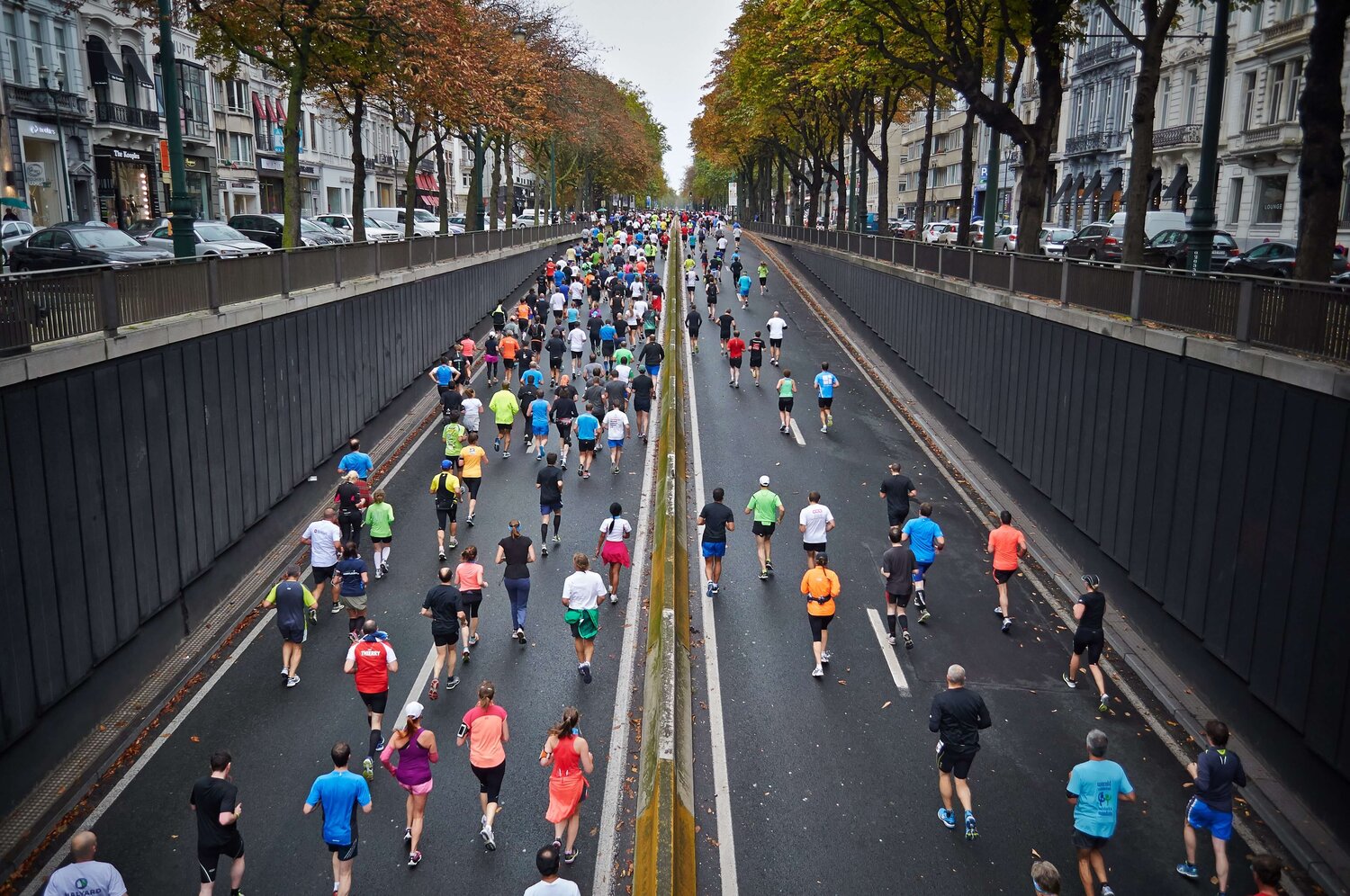Originally published on Swift, a healthy lifestyle blog.
In the span of less than a week, every race, from 5k to marathon, that I had planned to race or attend, has been cancelled. For the first time in 124 years, the Boston Marathon chose to postpone the race until September over COVID-19 concerns. Travel bans are being announced to and from impacted areas. The CDC has made strong recommendations to limit mass gatherings and social events to under 250 attendees to restrict potential exposure to the virus.
With the true impact and spread of the coronavirus yet unknown, city officials, local businesses, and race directors alike are taking proactive steps to safeguard the public against any further unwanted spread of the virus. High levels of anxiety and panic have caused grocery stores to sell out of many items, namely toilet paper and hand sanitizer, as many flock to stockpile groceries and household goods. Tensions and frustrations run high as many are witnessing retail and gym closures and modifications to their current routine.
No doubt that the concerns over COVID-19, or coronavirus, are polarizing. With new cases being confirmed every day in countries throughout the world, pessimism runs rampant. Constant news reports of increasing virus counts are stress-inducing. However, it’s easy to feel immune to the effects of the virus, and even the virus itself, until it comes into your country or your city. That’s what many runners this week have been facing in Austin, Texas, as we just received word of our first confirmed coronavirus cases.
Through it all, I will admittedly say, that I’ve felt a little lost. As both a running coach and an athlete, I highly empathize with those runners who watched their spring “A-race” PR goals shatter or their Boston Marathon dreams postponed until September. I empathize with the runner who has finally had an injury-free season and now no longer has a race to showcase their talent. I empathize with the athlete who has lost all motivation, knowing they could be confined to their house for an unknown length of time. I also empathize with local business owners who have had to make the tough calls to close their doors to prevent contamination and the race directors who have cancelled the events they have spent months planning.
I’ve heard and read many reports of runners stating how their training was “for nothing” and their “fitness is wasted.” Now, more than ever, is the time to stand together in solidarity. These safeguards that many are putting into place are here to protect us, so that we can continue to train together and participate in this sport that we love. How we shift our mindset and unite as a running community is more important than ever.

Celebrate Your Healthy Body
As runners, we spend a tremendous amount of time on our fitness. Every run has a purpose, whether that is for speed or recovery. But we too often forget the rippling effects that training has on our body. Sure, we train for a specific race. Our training blocks last for months, broken down into weekly cycles to optimally prepare us for one specific day, one singular race. But, training is about so much more than simply race day.
We are fortunate enough to be able to run. While the coronavirus disproportionately affects the elderly and those with underlying conditions, according to the CDC, we are lucky enough to be in the healthy majority. We have the ability to wake up each morning and choose to lace up our shoes and go for a run. The question, for many of us, is not if we can run, but instead, how far or how fast. Celebrate that fact.
The changes that you have made in your running routine have cascaded into your entire lifestyle. While you were preparing for a race, you ate healthier and paid more attention to your sleep hygiene. You set that 6am alarm instead of hitting snooze.
For the beginner runner, maybe this new level of training meant that you lost weight or gained muscle. When you look in the mirror, you’ve become proud of what you see because you know you’ve worked towards a goal that you never thought possible. What we don’t realize is that these changes aren’t always physical, but mental, too. Your confidence, not just in your ability to run, but as a person, has grown.
For the seasoned runner, maybe you’ve pushed the pace this training cycle. Maybe you have been more dialed in, more focused. With your sights on a new PR, maybe you’ve finally added in the extra 1% into your training routine that will get you to the start line, ready and injury-free.
Even though you might have lost this upcoming finish line, it isn’t to say that your training is for naught. Each and every step that you’ve taken to get to this point has resulted in an overall healthier lifestyle. This training cycle, while it might not culminate in an upcoming race day PR, is the perfect building block to continue to layer additional training on. Just because the race won’t happen, doesn’t mean that the training scale is turned back to zero. Take what you have learned and started and build upon it.
Don’t Lose Motivation
Now is not the time to lose motivation. In fact, it’s a time to grow. With so much negativity in the media, now is the optimal time to focus on your mental health. Many of us use running as an escape, a stress reliever, or a way to have control over something in our life. With so much seemingly outside of our control, don’t give that up simply because your race was cancelled. A healthy training cycle will always have a period of downtime to recover and refocus, but a healthy mindset is something that we should allow ourselves to work on daily.
Now is the perfect time to get in touch with what you love about running. Take away the stress of training and the pressure to compete and circle back around to the simplicity of it all. Why did you start running in the first place? What is your “why?” Does it change if you no longer have a race to compete in?
For those that are in heavily affected areas, you might not be able to go outside for a run. What happens when you shift your mindset from the negative of missed miles to the positive of what you could do from home? Perhaps staying inside could mean that it is the perfect time to start an at-home strength training program that you’ve been neglecting. Maybe this is a good time to focus on sleep and recovery. Spend more time with family.
You have the unique ability to choose to look at the positive and use it to your advantage. There are those among us who are fearful and anxious and a constant barrage of the current news cycle only makes matters worse. But practicing responsible social distancing does not stop you from getting your heart rate up, taking advantage of getting in fresh air and sunlight, and performing the self-care that we all need to keep our mental health intact.
Try This: The Complete Guide To Runner’s Strength Training
This Is A Lesson In Patience
We’ve all been in a situation as runners where a race we wanted to run didn’t happen. Maybe it was an unexpected injury; maybe it was a weather-related event. Regardless, in those situations, we accept and adapt. But, much like an injury, this is a lesson in patience. We’re often taught in training that we need to trust the process. It might seem hard at first, this weird idea that somehow all the hard workouts and fatigued runs will come together and make sense, but I promise you, it does. There will always be more start lines.
For most of us, this is merely a moment in time that causes a temporary inconvenience to your routine. Yes, it’s unfortunate. Yes, it’s not ideal. But, right now, this isn’t just about us. This is about protecting the population as a whole. This is about protecting those that, unlike us, can’t run. Those who likely wish they had the healthy bodies that we do. This is about social responsibility. And, if we don’t take this precaution now, there may be no more start lines for some.
Race Directors Are Doing The Best They Can
With so many widespread cancellations and rescheduled races, I’ve seen many angry comments about the lack of refunds on race entry fees. I can’t stress enough that this was not a decision that was made flippantly. These race directors have spent countless months and countless hours organizing these events. Many times, the money from the entry fees has already been spent on the perks that we runners love so much: swag bags, t-shirts and race medals. But so much more of the money is spent behind the scenes, paying for permits, staff, and security so that these races can go on as scheduled. The race isn’t simply “keeping your money.”
When we sign up for a race, we all sign the same non-refundable waiver. While this is most certainly a situation outside of our control, many race directors (especially those races that I have signed up for) have been more than accommodating, whether that being rescheduling the race entirely, deferring entries, or allowing transfers to different races. Many of these races are small businesses and they take a huge loss to be able to offer such generous accommodations for us. We are all in this together.

What You Can Do:
You might feel helpless to stop what is happening in the world around you, but you don’t have to. Each one of us can play an important role in safeguarding and helping our running community.
Support Local Gyms & Running Stores
Small and local businesses are likely to be hurt the worst by store closures and reduced sales. If you’re in need of a new pair of running shoes or handheld, buy them at your local running store. If possible, don’t cancel your gym membership. Many small businesses are depending on that monthly income to not only pay their staff, but to pay rent to provide a place for you to train from.
Check In On Your Friends
While some of us may not be as affected as others, check in on your friends, especially those in the at-risk categories. While you may not be able to visit them in person, a phone call or a text can go a long way in soothing someone’s anxieties.
Practice Kindness
Above all else, practice kindness. While we can’t always control the events around us, we can control our actions.


